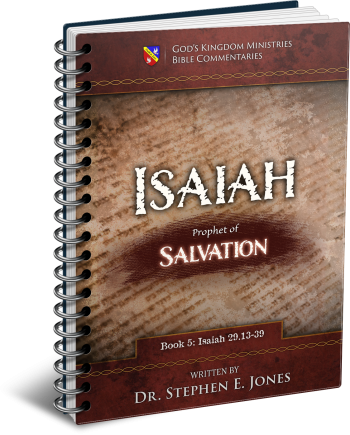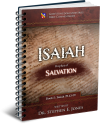Latest Posts
View the latest posts in an easy-to-read list format, with filtering options.

Isaiah is the prophet of Salvation. He is also known as the truly "Universalist" prophet, by which is meant that He makes it clear that salvation is extended equally to all nations and not just to Israel. He lived to see the fall of Israel and the deportation of the Israelites to Assyria, and he prophesied of their "return" to God (through repentance). He is truly a "major prophet" whose prophecies greatly influenced the Apostle Paul in the New Testament.
Category - Bible Commentaries

After giving the word of the Lord against the king of Assyria, Isaiah then gives the sign providing the double witness to the word. Isaiah 37:30 says,
30 “Then this shall be the sign for you; you will eat this year what grows of itself, in the second year what springs from the same, and in the third year sow, reap, plant vineyards and eat their fruit.
This is a Jubilee sign, where they were not to sow or reap two years in a row, the 49th and 50th year of the cycle (Leviticus 25:4, 5, 10-12). Specifically, Isaiah uses terminology from Leviticus 25:11, 12,
11 You shall have the fiftieth year as a Jubilee; you shall not sow, nor reap its aftergrowth, nor gather in from its untrimmed vines. 12 For it is a Jubilee; it shall be holy to you. You shall eat its crops out of the field [i.e., “what grows of itself”].
The first two years of this sign had already passed, during which time the men of Judah had not been able to plant their crops, due to the invasion of Sennacherib. Hence, the deliverance of Jerusalem was imminent, though unexpected by most, and they were soon to sow their crops that would ripen the following Spring.
This great deliverance teaches us the prophetic meaning of the law of Jubilee. In the law, the Jubilee was about all debts being canceled. It was about slaves, having been sold into slavery for sin-debt, being set free to return to their families and their land inheritance. Judah’s sin had indebted the nation, but it is as if they had been convicted in the divine court toward the end of a Jubilee cycle. Hence, they were set free after just two years of serving out their sentence.
The law of Jubilee is the law of grace, where all debts are canceled fully. More specifically, God Himself takes the loss and pays the penalty to satisfy the law. Therefore, we see that the benefits of the Jubilee that we enjoy are based on the fact that Jesus paid the debt of the whole world when He gave His life on the cross.
In other words, the Jubilee cost Him everything so that the indebted creation could be “set free from its slavery to corruption into the freedom of the glory of the children of God” (Rom. 8:21). That is grace.
Grace is a sovereign act of God that benefits sinners. Jerusalem’s deliverance, then, set a precedent for the deliverance of creation itself and was thus a type and shadow of greater things yet to come.
Isaiah 37:31, 32 says,
31 The surviving remnant [sha’ar, “remnant”] of the house of Judah will again take root downward and bear fruit upward. 32 For out of Jerusalem will go forth a remnant [she’eriyth, “remnant, remainder, what is left”] and out of Mount Zion survivors [peleytah, “what has escaped”]. The zeal of the Lord of hosts will perform this.”
Isaiah uses three different Hebrew words in referring to the remnant. The most significant word is sha’ar, as this was also the name of his son (She’ar-jashub, “the remnant will return”). He was the son that the prophet took with him to talk to Hezekiah’s father in Isaiah 7:3.
Both of Isaiah’s sons were named prophetically. His other son, Maher-shalal-hash-baz (Isaiah 8:3), was named to prophesy the destruction of Israel and the people’s exile. She’ar-jashub was named to give hope for the “return” after their “seven times” of tribulation had ended. Isaiah’s sons gave hope in the midst of exile.
However, King Hezekiah had no heir and his own life was being threatened by the king of Assyria. The lineage to the Messiah was being threatened. So the deliverance of Jerusalem and the survival of the remnant was applicable to him personally. Jesus was to be born of his line, and we know that Jesus is the Head of the remnant company. Together, they are the Body of Christ.
As we will see later, Hezekiah survived long enough to have an heir, who was named Manasseh. He was a type of the remnant in long-term prophecy.
On the most mundane level, of course, the refugees in Jerusalem, those Judahites from the surrounding communities who had escaped the Assyrians, were also types of the remnant. Thus, after the Assyrian army was destroyed, they were able to return home, plant crops, and put down their roots in their own inheritance. But in the end, the general population are never the prophetic “remnant,” because most remained carnal. In the big picture, only the overcomers are the remnant.
These are the remnant of grace that God has set apart for Himself, those whom He has called by His own sovereign will (Rom. 11:4-7). For this reason, Isaiah 37:32 concludes with, “The zeal of the Lord of hosts will perform this.” Grace is a sovereign act of God; therefore, the Jubilee too has nothing to do with men’s works or the will of man.
The return of the remnant has a counterpart in Assyria’s “return.” Isaiah 37:33-35 says,
33 “Therefore, thus says the Lord concerning the king of Assyria. ‘He will not come to this city or shoot an arrow there; and he will not come before it with a shield, or throw up a siege ramp against it. 34 By the way that he came, by the same he will return, and he will not come to this city,’ declares the Lord. 35 For I will defend this city to save it for My own sake and for My servant David’s sake.”
Assyria’s “return” had already been prophesied in Isaiah 37:29, “And I will turn you back by the way which you came.” The deeper prophetic significance of Assyria’s “return,” however, will be explained in the next chapter (Isaiah 38).
Meanwhile, we read how God defended Jerusalem and caused King Sennacherib to return to his own land without finishing his conquest. Though he was able to keep the captives that he had sent into exile, his campaign to subjugate Lebanon, Judah, and Philistia ended in disaster and failure.
Isaiah 37:36 says,
36 Then the angel of the Lord went out and struck 185,000 in the camp of the Assyrians; and when men arose early in the morning, behold, all of these were dead.
In the longer account we read in 2 Kings 19:35,
35 Then it happened that night that the angel of the Lord went out and struck 185,000 in the camp of the Assyrians, and when men rose early in the morning, behold, all of them were dead.
Therefore, the word of the Lord was fulfilled immediately that same night. Historians assume that the army experienced a rat-borne bubonic plague. Herodotus, the Greek “Father of History,” speaks of a tradition of a plague of field mice that chewed through the bowstrings of the Assyrians during the Egyptian campaign.
Whatever method God used, with a large part of his army destroyed and an Egyptian army approaching, Sennacherib was forced to retreat and return to Nineveh.
37 So Sennacherib king of Assyria departed and returned home and lived at Nineveh. 38 It came about as he was worshiping in the house of Nisroch his god, that Adrammelech and Sharezer his sons killed him with the sword; and they escaped into the land of Ararat. And Esarhadden his son became king in his place.
The Assyrian inscriptions tell us that he was probably killed about twenty years after returning to Nineveh. They also show that Adrammelech was called Adadmilki and Sharezer was called Shar-usur. After these two sons assassinated their father, they were forced to flee to the land of Ararat in central Armenia, while another son, Esarhadden took the throne. Esarhadden was the one who replaced the Israelites with settlers from five other regions (2 Kings 17:24; Ezra 4:2).
Adrammelech means “honour of the king.” Sharezer means “prince of fire.” Esarhadden himself was probably absent from Nineveh when his father was killed, because Sennacherib had made him the prefect of the province of Babylon. Therefore, he already enjoyed considerable power and was able to prevent his brothers from taking the throne after assassinating their father.
Assyria never again tried to conquer Judah. A century later, the province of Babylon revolted and overthrew Nineveh in 612 B.C. Once the Babylonians consolidated their power, replacing the Assyrian Empire, Nebuchadnezzar and his father conquered Judah, succeeding where Assyria had failed previously. This time Judah did not repent or seek God for help, and so, after a delay of more than a century, the prophecies of Jerusalem’s destruction were fulfilled.